Alli Marshall's Blog, page 15
January 26, 2016
Three fiction-writing goals
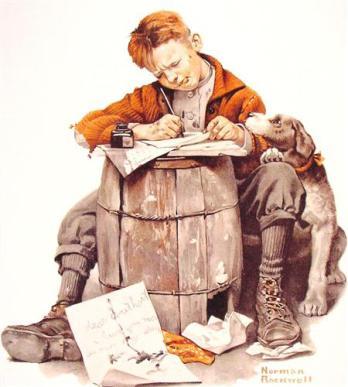
“Little boy writing a letter” by Norman Rockwell
1. Spend extra time line editing
I’m starting with the most boring goal first because I believe in getting the most-dreaded task out of the way. And, between you and me, I’m not a good typist. I’m creative, and I get the work done, but I use about four fingers to type. I need to learn to type for real — I even started an online course before Christmas. But you know how it goes: Life is busy, we all have to make tough choices, and while proper typing would be a great skill to have, it’s not at the top of my to-do list.
Admission No. 2: I’m not a great speller. I peaked in third grade with “monotonous” during a spelling contest. Because I’m a Francophile, I can usually pull off “hors d’oeuvres.” But in editing my own work, I find TOOs that should be TWOs, and more than once I’ve signed off an email with “Brest” instead of “Best.” I really don’t want to wish any future potential literary agents All My Brest.
2. Spend less time worrying about if it’s done or not.
I was at an Elizabeth Gilbert talk once when someone in the audience asked how she knew a project was finished. Her answer: “When it’s 84 percent done.”(She might have said 79 percent or 92 percent, but you get the picture.) I like that because stories (and novels) can be endlessly tweaked. If you hang onto one long enough, you’ll find all sorts of things that could be changed, honed, improved. This is what I believe: I’ll be a different writer in two years from the writer I am today. Hell, I’ll be a different writer in two weeks. But that doesn’t mean the writer I am today isn’t creating worthwhile work. If I keep waiting for my knowledge and skill to catch up with the ultimate potential of today’s story, I could be working on the same 3,000 words until I’m 95. I hope I’m still writing when I’m 95. I hope I live long enough to be utterly embarrassed by what I wrote in my 40s. But for that to happen, 1) I need to live at least 50 more years and, 2) I need to finish some stuff and move on.

Image from http://scienceblogs.com
3. Find ideas in the strangest of places
I used to think — as many of us do — that I needed to wait for an idea to hit me over the head. It’s the romantic ideal of writing, that inspiration comes in lightning strikes. Luckily (because who really wants to be struck by lightning? And also, theoretically, it doesn’t strike the same place twice), I realized I could seek out ideas. Eavesdropping, people-watching, morning TV shows, parades, the mall — all of these places/things/bad habits have inspired plots or characters. Family can be a rich source of material. Riding a bus while on vacation in another country is hard to beat. I recently got a story from the gym locker room (that sounds weird, I know). As I type this, I’m listening to my co-worker read from a press release about a food tour in eastern Tennessee during which there’s a stop to sample Dolly Parton’s favorite hamburger. Fiction is often just the truth with the names changed to prevent the guilty from Goggling themselves.
My point is that hunting for stories should be less like standing outside, in a rainstorm, holding a metal rod, and more like going to the weirdest, most colorful jumble sale and seeing what treasures you can score for $20.
Filed under: creativity, fiction, inspiration, Writing


January 19, 2016
My path to writing
 Last night I attended the inaugural Writers Coffeehouse in Asheville. It’s a great idea (originated by New York Times best-selling author Jonathan Maberry and now popping up all over the country) in which writers help other writers with information about publishing, promoting, networking, etc. It’s all about the business of writing and not at all about the craft.
Last night I attended the inaugural Writers Coffeehouse in Asheville. It’s a great idea (originated by New York Times best-selling author Jonathan Maberry and now popping up all over the country) in which writers help other writers with information about publishing, promoting, networking, etc. It’s all about the business of writing and not at all about the craft.
The meetup began with host Jake Bible and his guests, Beth Revis and Nathan Ballingrud, both talked about their paths to becoming published authors. And while I enjoyed the whole event, I felt like the biggest takeaways for me came from those introductions because two of the writers admitted to writer-path experiences that I identify with — and have long been embarrassed by.
From Nathan, that he’s 45 but, with only one published book to his name, feels like he’s just at the beginning of his career. And from Beth, that she wrote and submitted 11 manuscripts to agents before selling a novel.
So maybe my own path isn’t so singular or so strange as I’ve long suspected. I thought it would make an interesting exercise (and perhaps lead to connections with fellow writers) to share my literary backstory. Here it is:
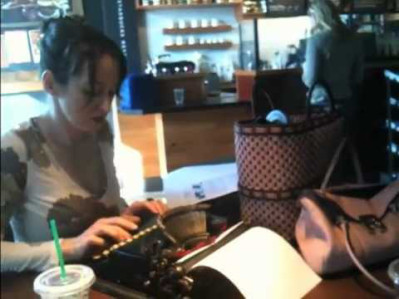 As a kid I was always interested in art. I wrote my first book when I was 7. It was called Memory is Mine, a story about a boy named James and his horse who, in the end (spoiler alert), turned out to be imaginary. I was also into drawing, painting, fashion design, fashion illustration, archaeology, ballet, and horseback riding. As teenager, I once wrote a poem with the verse, “You’ll never be the same as the night before / when you asked her in what were you looking for? / Was loving her what you had in mind / or a one-night stand you could leave behind?” My best friend at the time accused me of plagiarizing White Snake, so it’s possible I missed my calling as a hairband songwriter.
As a kid I was always interested in art. I wrote my first book when I was 7. It was called Memory is Mine, a story about a boy named James and his horse who, in the end (spoiler alert), turned out to be imaginary. I was also into drawing, painting, fashion design, fashion illustration, archaeology, ballet, and horseback riding. As teenager, I once wrote a poem with the verse, “You’ll never be the same as the night before / when you asked her in what were you looking for? / Was loving her what you had in mind / or a one-night stand you could leave behind?” My best friend at the time accused me of plagiarizing White Snake, so it’s possible I missed my calling as a hairband songwriter.
In high school, my friend Ann Marie introduced me to keeping a journal, which I do to this day. For years my journals were large and intense, full of poems and insights and drawings. These days they’re more like quick to-do lists and complaints that no one else wants to hear. Still. I journaled all the way through college, especially on my semester abroad. In fact, I was terrible at pretty much everything that wasn’t journaling. But even after my teacher commented a number of times, “You write like a wiz!” I didn’t think about becoming a writer.
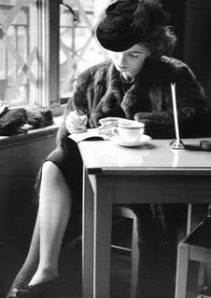 After graduating with a BA in Human Studies (I know, I know) and no idea of what I wanted to do with my life, I decided to get an MFA in creative writing because it was that or work in a group home forever. Because I had to pick a concentration, I chose poetry thinking poems are shorter than stories and therefore easier. When I was 26, I always chose the easy way out of every situation.
After graduating with a BA in Human Studies (I know, I know) and no idea of what I wanted to do with my life, I decided to get an MFA in creative writing because it was that or work in a group home forever. Because I had to pick a concentration, I chose poetry thinking poems are shorter than stories and therefore easier. When I was 26, I always chose the easy way out of every situation.
But approximately five minutes after completing my MFA in poetry (which was not easy, by the way), I got an idea for a novel. I started writing it while on vacation at the beach and continued, obsessively, at my job as an administrative assistant. I finished the novel in five weeks. It was terrible, but I didn’t know that. I spell checked it and sent it out to maybe 10 agents, all of whom (huge surprise) rejected it.
The next year I wrote another novel (Dashboard Deity, about a woman traveling through India and striking up a tenuous friendship with her Indian chauffeur), and then another and another. I didn’t necessarily complete one per year but, over time, I’d written seven. One about a dating show (I was trying my hand at chick-lit), one about gay teenagers, one about a world-music radio-show host, one about a travel adventure in Sri Lanka. But, while I tried different genres and various storylines, I never really edited my work. I wrote a fast draft and was ready to be done with it. Agents aren’t impressed by that. Tom Robbins claims he never rewrites, but there can only be one Tom Robbins. So in 10 years, despite writing lot of words, I didn’t sell a manuscript.
I am an arts writer. I’ve written and edited for the alt-weekly Mountain Xpress since 2003. That means my work is published regularly and I get frequent feedback from my readership. That helps. Journalism keeps me writing every day. It’s taught me about craft and it’s put me in touch with the authors and artists who inspire both my professional and creative work.
 In 2011, during a trip to Concord, Mass., my husband suggested I write what I cared about and stop trying to write what I thought might sell. That fall, I started How to Talk to Rockstars. I loved the book and spent many months and many drafts editing it. I sent it to agents, got an offer, and signed a contract — finally!
In 2011, during a trip to Concord, Mass., my husband suggested I write what I cared about and stop trying to write what I thought might sell. That fall, I started How to Talk to Rockstars. I loved the book and spent many months and many drafts editing it. I sent it to agents, got an offer, and signed a contract — finally!
And then it didn’t sell. After six months of pitching to publishers, my agent gave up and we went our separate ways. I’m not sure if that’s typical. I was devastated to lose my agent, but after a couple of months of soul searching, I decided to try to sell my book to a small press. In the summer of 2014, I signed a contract with Logosophia Books and, in May 2015, How to Talk to Rockstars was released.
I’ve since rewritten a young adult novel and the Sri Lankan travel adventure from my backlog of manuscripts. I’ve also completed drafts of two new novels, one that I’m madly in love with.
I still don’t have an agent. And I feel like, this many years and pages, this many hard lessons and tears and thrilling accomplishments later, I’m just at the beginning of my writing career. But I’m OK with that. It’s a hopeful and exciting place to be.
Filed under: Books, creativity, inspiration, Writing


January 9, 2016
2016 Shrewd Writer Award winner!
I’m so excited to share that my short story, “Structural Soul,” won the 2016 Shrewd Writer Award from Short Tale Shrew. Follow the link to read the story,
Source: Our 2016 Shrewd Writer Award goes to…
Filed under: contest, fiction, flash fiction, short story


January 1, 2016
Best nine of 2015!
Wherein I posted lots of photos of my face, my book, pretty trees, breathtaking buildings, and cute dogs.

Filed under: How to Talk to Rockstars, photos


December 31, 2015
New Year’s slogans
I don’t have a strong feeling one way or the other about new year’s resolutions. I am (perhaps annoyingly) one of those people who sets goals and doggedly works toward them. I don’t always achieve what I set out to accomplish (mastering salsa dancing, learning to crochet, speaking fluent French), but I have started an exercise routine in January and kept it up for five years, so.
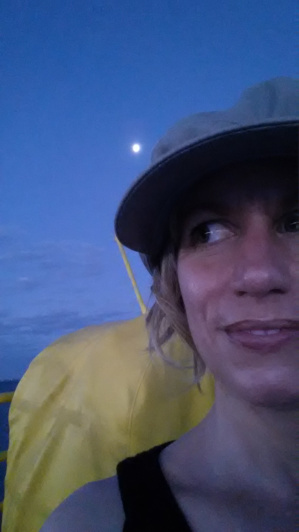 This is not about my tenacity, however. It’s about how I went to a birthday party years ago and heard a really cool woman explain how, instead of resolutions, she makes slogans. Simple things like, “TCB” (Taking Care of Business, for the two non-Elvis-fans on the planet) or “Dance My Ass Off” (for those who are better at salsa than me). The point is just to come up with a tagline for what you hope the year will bring. Something fun and punchy, but also personally motivating.
This is not about my tenacity, however. It’s about how I went to a birthday party years ago and heard a really cool woman explain how, instead of resolutions, she makes slogans. Simple things like, “TCB” (Taking Care of Business, for the two non-Elvis-fans on the planet) or “Dance My Ass Off” (for those who are better at salsa than me). The point is just to come up with a tagline for what you hope the year will bring. Something fun and punchy, but also personally motivating.
That was right before the start of 2012. That year, I made my slogan “Doin’ My Thing,” and then I did stuff that I’d wanted to do but always found excuses not to do. I applied for an received a media pass to South By Southwest, where I spent four days absorbing music and documenting it on a blog. I purchased a plane ticket to Paris and spent eight days there by myself, taking in fashion, impressionist art, wine and cemeteries.
The thing with resolutions is they’re chorelike and guilt-inducing. Spend less, eat less, exercise more, call your mother. Ugh, stop nagging me. Resolutions make me think of Lent, my knowledge of which is based on overhearing the Catholic kids in middle school talking about how you can get around it by giving up something you hate. Like broccoli or violin lessons.
Slogans, on the other hand, suggest fluttering banners and crafty logos emblazoned on bright t-shirts. They hint at teams and cheerleaders and ribbon-strung finish lines, or confetti streamers and clever chants. It’s a lot easier to get behind a good slogan, plus you’ve got THE ENTIRE YEAR to see it to fruition — and even then, it’s a theme, not a directive.
My slogan for 2016 is “Creating Momentum,” because I’ve been noticing lately how lots of small steps eventually add up to giant leaps. I have my big life goals but, because I’m busy and my days are hectic, I’m always going in a million directions. The only way to accomplish a goal is chip away at it, bit by bit. By making my mission one of momentum, I’m reminding myself that these small steps are still worthwhile and exciting, that I’m already in motion and moving toward my heart’s desire.
To you, my friends, I wish a momentous new year. I hope you feel your own motion; I hope your own hearts’ desires pull you like glittering magnets. Be well, be bold, be who you need to be.
Filed under: creativity, inspiration


December 29, 2015
Excavation
December 23, 2015
Q+A with author Latoya Brown
Entrepreneur, digital media marketing consultant, and world traveler Latoya Brown is the author the recently published book, Wanted: Green Card. She also manages a companion blog and online show that both deal with marriage fraud.

Your new book, Wanted: Green Card, is inspired by a painful personal experience. Why did you decide to go public with the story?
Latoya Brown: I decided to go public with this issue because there are a lot of other women who will not. They are hiding in shame from a failed relationship; many of these ladies did indeed help their mate to their home country and they abandoned them not long after receiving the green card. Also, sharing this story is a part of the healing process to moving forward — for them and for me.
How did the process of writing help you to heal?
I am very candid in my blog and in the book — nothing is held back. In this experimental presentation, you can read the book and chuckle at me begging to stay with a person I was carrying financially, or empathize at the fact that he was plainly obvious in his goals of being a user.
As I share all the details in my blog, and the words flow from the pecking of my keyboard I hope that I am reaching other ladies in order to warn them of what could happen.
In your book blurb you point out that “marriage fraud is an international issue that is growing momentum.” Why is this problem on the rise?
The problem is on the rise because of the Internet. Most of the romances start on Facebook or somewhere online and with that technology the men can then reach across the ponds to their new targets and shower her with all kinds of faux love.
What do you hope readers take away from your book?
I hope that the readers will take away empathy and also a pocket full of awareness.
What did you learn about yourself while working on this project?
I learned I don’t like bullshit. I may be distracted, but I do recognize b.s. when I’ve said “I do” to it. And once I come out of that fog I will continue to be phenomenal and continue on track. I think during that relationship I was on track, but slowed down tremendously because of partnering with a mate with bad intentions who was trying to convince me it was sunny while it was raining.
What route did you take with publishing — traditional, small press or self publishing — and why?
Self published because my story could not wait on approval from others to get it out to the public.
What are you currently working on?
The project I am focused on right now is my organization, International Wives of African Men. It has become a support system for many ladies to showcase the negative and the positive of being in a relationship or marriage.
Filed under: Author Talk, Books, Q+A


December 22, 2015
Sparkle
December 19, 2015
Arrival
I’m working on a series of linked short stories around the theme of travel in India. I recently came across this essay that serves as a sort of jumping-off point for the short stories.
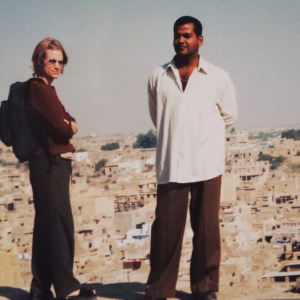
Jaisalmer, 2001
Most people on planes and in the bleary pre-dawn of airports are fine with anonymity. With remaining strangers. Not Celeste. She adopted Mom and me somewhere between de-boarding and baggage claim. “Watch my stuff,” she said, and we did while she ran into the bathroom. It was still most of a year before 9/11. You could watch a stranger’s bags. And Celeste was instantly familiar.
“I’m not going back to the United States until George Bush is out of office,” she said on the way through Customs. He’d been in office for less than a week. I still felt the shock waves of his election. Clinton was the first president I’d been old enough to vote for. I naively thought the optimistic flush of the ’90s would continue Indefinitely.
But Celeste wasn’t interested in giving the new president a chance. She had a shaved head, a septum ring and a full-sleeve tattoo. “That’s cool,” Mom said, nodding at Celeste’s arm. “Maybe I should get one.”
“You should,” Celeste said. “Tattoos are cheap in India. Everything is. You can live here on, like, $1,000 a year.”
I wasn’t sure if that was true. There were people in India who lived on far less. People who lived in boxes, drinking dirty water and eating scraps, ephemera and dust. I’d taken a trip to India seven years earlier and had gone six weeks with $200 in traveler’s checks. It was stressful, but everything about being young and stupid and 12,000 miles from home was stressful.
Celeste, in her gold harem pants, teal tunic and giant hoop earrings, looked like she stressed over very little. Plus, she told us, she was meeting friends in a few days. Her friends were in India studying contortions and tightrope walking.
“So basically you’re running away to join the circus,” I said. She shrugged. We collected our backpacks from the luggage carousel — I still had the pack from my college trip. I’d imaged becoming a world traveler after college, but then I found out how much a round-the-world ticket cost. I realized that being college-broke was nothing like being real-life-broke. Instead of flying to Nepal or Kenya, I got a job and a housemate and a dog. I wasn’t exacly selling my soul for the American dream, but I sure wasn’t running away to join the circus.
Celeste reminded me of how wild I wasn’t, but Mom saw her as one of us. Celeste was a shaven-headed, tattooed, harem pants-wearing exPat, so therefore Mom was, too. Why not? “Do you want to share a cab?” Mom asked our new best friend.
“You can’t just hail a cab in India,” I said.
“Of course you can,” Mom said. “I can see them from here.” It was true, they were lined up outside baggage claim, just beyond the doors. Drivers in turbans, drivers in sweaters and flip-flops. There were motorcycle rickshaws, bicycle rickshaws and Ambassador cars. But what I knew that my mother didn’t know was that the moment we walked out of the airport, we’d be descended upon. We’d be mobbed and grabbed and and shouted at. Our bags would be snatched from our hands and thrown into one cab or another. Maybe different cabs. The drivers would promise cheap rates, special deals, and tours of places we didn’t want to tour. And despite our best intentions to be resolute, we’d be led like idiot children. The confusion would be compounded by our jetlag.
“We need a plan,” I said. “We need to know where we’re going and how much we want to pay.”
Celeste and Mom both looked at me expectantly.
“We should go to the old city,” I said, only because that’s where I stayed before. In the Navrang Hotel, a dreary, multi-level place that used to be a prison. All of its rooms looked into the same concrete courtyard, voices ringing in the central space all day and night. The truth is that I couldn’t imagine my mother in that dive of a place, with its bucket shower and squat toilets. But I hadn’t stayed anywhere nicer. I looked in my guidebook for a hotel nearby, something with a balcony and a Western toilet. I picked the Hotel Ganesh, and we all repeated the name like a safe word.
Somehow we got a cab. Our bags were ripped from our hands and tossed into the trunk of an Ambassador. I continued to chant “Hotel Ganesh! Old City!” Until our bearded driver eased away from the airport and into traffic.
It was four in the morning. Delhi was a blur on the horizon, a haze of light pollution and smog. It welcomed us with a cool shrug. January in northern India, it turned out, was chilly — too cold for sandals and the thin pants I was wearing, even though I’d obsessed over my outfits for weeks. I’d just assumed it would be hot. Celeste had sweaters in her bag because she’d packed for going everywhere, forever. But Mom and I were only traveling for three weeks which. At four a.m., from the back of an Ambassador cab careening into Delhi’s sleeping guts, three weeks seemed far too long.
On my first trip to India, which was also my first trip out of the U.S., I existed in a sort of culture-shock-panic-attack-uphoria. Everything was simultaneously wonderful and horrible. The madness of the market — sari silks, butchers, flower sellers, tea stalls, accountants, motor parts, tailors. Everything you could need, and all the brutality and beauty of the world concentrated and sped up. I smiled at cows decorated with marigold garlands and startled at beggars distorted by leprosy. Cute children pleaded for coins, but if I gave them one, an insatiable mob suddenly emerged from out of nowhere, grabbing at my clothes and clawing at my purse.
It took years to get over India, to dare to go back. It was my mother’s idea to take the trip together. Our sometimes-strained relationship improved with her offer to pay for the plane tickets. She wanted to go, and she thought I could be her tour guide.
I quickly realized that the India I’d first visited had vanished, morphed into a different India. All the streets had shifted. The small places I’d visited before had gone and new places appeared in their wake. Of course the big places were still there. The famous places: The Taj Mahal and the Red Fort. The Kamasutra temples and the Palace of the Winds. But the sandal sellers, chai wallahs, noodle shops, and flower peddlers I remembered were nowhere to be seen.
The Navrang Hotel had disappeared, too. At least I never saw it again. I also never saw the Hotel Ganesh. Instead, our taxi pulled up to the Ganesha House. “I don’t think this is right,” I said.
“Yes, is right!” said the driver.
“But it’s not the Hotel Ganesh.”
“Ganesh, Ganesha. Same thing in India,” said the driver.
I was pretty sure it wasn’t, but Mom and Celeste were already getting out of the car.
“I just want to get some sleep,” Mom said, wandering toward the front door. It was dark, and locked, but with some banging a sleepy clerk let us in and looked half-heartedly at our passports. We were given two rooms.
The cold was pervasive. Instead of sweating in long skirts, Mom and I shivered under a thin blanket on our shared bed. In the morning, which came soon, we could go to the market and but sweaters, shawls and socks. Whole new wardrobes for a few American dollars. That part of India still existed: everything, almost all of the time.
But in the weird in-between, in the dark chill and absence of everything familiar, we waited for sleep that didn’t come. We waited for the light that would carry us into the next world — maybe a market, maybe a temple, maybe a circus full of runaway ex-pats.
Filed under: essay, inspiration, memoir, travel














